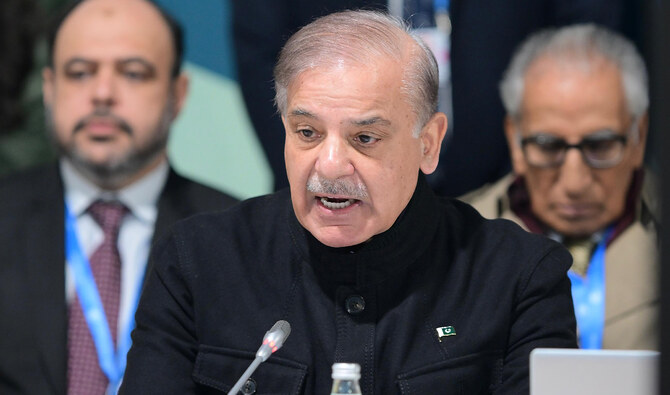Baku, (Newsman): Prime Minister Shehbaz Sharif said on Tuesday that developing countries will require an estimated $6.8 trillion by 2030 to implement less than half of their current nationally determined contributions (NDCs) — the national action plans for reducing emissions and adapting to climate impacts, as defined by the Paris Agreement.
He was addressing the World Leaders’ Climate Action Summit at COP29 in Baku, where nearly 200 countries have gathered to negotiate the New Collective Quantified Goal (NCQG).
This new agreement aims to raise billions of dollars in climate finance for the regions most affected by climate change. However, a dispute remains over the list of contributing nations.
While the United States, Europe, and others have expressed a willingness to contribute, they insist that major economies such as China, South Korea, and Singapore should also be part of the contributing countries.
This disagreement has caused a deadlock, potentially impeding progress in the ongoing talks.
Sharif stressed that the financial needs of developing countries have been exacerbated by a year of catastrophic climate-related events, which have spurred demands for climate financing.
Pakistan, ranked the 5th most vulnerable country to climate change, experienced devastating floods in 2022 that killed over 1,700 people and affected more than 33 million.
The floods caused economic losses exceeding $30 billion, and despite international pledges of over $9 billion to assist in recovery, Pakistani officials say that little of the promised funding has been delivered.
“Developing countries will need an estimated $6.8 trillion by 2030 to implement less than half of their current NDCs,” Sharif stated. He called on donor countries to honor their commitment to allocate 0.7% of their gross national income (GNI) for development assistance and to fully capitalize existing climate funds.
Sharif also highlighted the shortfall in the $100 billion annual climate finance pledge, which was agreed upon at COP15 over a decade ago. According to the Organization for Economic Co-operation and Development (OECD), the fund has only reached $160 billion to date. Despite this, Sharif noted that much of the financing is in the form of loans, which exacerbates the debt burden on developing countries, putting them at risk of falling into “debt traps.”
“Pakistan, alongside many other developing nations, calls for stronger and more equitable climate finance mechanisms. Debt should not become the new normal for climate financing. We must refocus on non-debt financing solutions that enable countries to fund their climate initiatives,” he emphasized.
The Prime Minister also called for the United Nations Framework Convention on Climate Change (UNFCCC) to establish a committee to periodically review NDCs.
Also Read: Highlights from PM Shehbaz’s Attendance at COP29 in Baku
“We need to double adaptation financing from current levels. Additionally, loss and damage funds should be increased and directed toward building resilient infrastructure and addressing other urgent needs,” Sharif added.
Governments agreed last year to establish a new “loss and damage” fund to help poorer nations affected by climate-fueled disasters, with an initial pledge of $800 million. This fund is now being managed by a director and a host country, and COP29 will decide on how to distribute the funds, while also calling for further contributions.
Also Read: COP29 in Azerbaijan: Pakistan’s Ten Best Green Startups Revealed
On Tuesday, several of the world’s top multilateral banks, including the World Bank, the European Investment Bank, and the Asian Development Bank, pledged to increase climate finance to low- and middle-income countries to $120 billion annually by 2030.
This pledge represents a 60% increase over what these 10 multilateral development banks (MDBs) allocated last year to poorer nations.
The new target includes $42 billion for adaptation to the impacts of extreme weather, which is a 70% increase over the 2023 figure. This funding is part of the broader effort at COP29 to cap global warming at 1.5 degrees Celsius above pre-industrial levels by 2050.

